A good risk-based plan will translate to an excellent risk-based schedule, but it continues beyond there. To complete the statement loop, one must say, “A good schedule feeds back to the risk-based plan to make it better.”
Project management does not end after the team develops a project plan. The plan is more of a starting point than completing a management process.
When client and contractor start throwing accusations against each other surrounding schedule baseline management, one can easily conclude that a problem or issue is brewing. It can turn into significant risks.

Planning and Scheduling are Inseparable
Planning and scheduling are so tied together that some project management practitioners cannot distinguish the difference between the two. Some refer to the schedule as the plan and the plan as the schedule. A few assert their knowledge of their distinct nature by describing planning as a process that looks at a much more enormous scope than scheduling. Unfortunately, statements such as this can mislead others. It has to be corrected because it is not valid.
Incredibly, some working on a project fail to see the strong relationship between planning and scheduling. The two processes are inseparable, like a life-long partner. Planning is the soul mate of scheduling and vice versa. One cannot effectively exist without the other (Frago, 2014).
Plan Scope Equals Schedule Scope
If a project management student looks closer into any portfolio, he will recognize that every project has only one overall scope. Once baselined, the scope is expected to be the same as the following schedule. The plan scope and the schedule scope must be in alignment.
A schedule cannot have more than the scope in the plan. Otherwise, the project faces a problem. The content of one cannot be greater than the other. Continuous collaboration will see to it that it is maintained that way. A project manager who does not know this fundamental concept will face problems he won’t effectively handle.
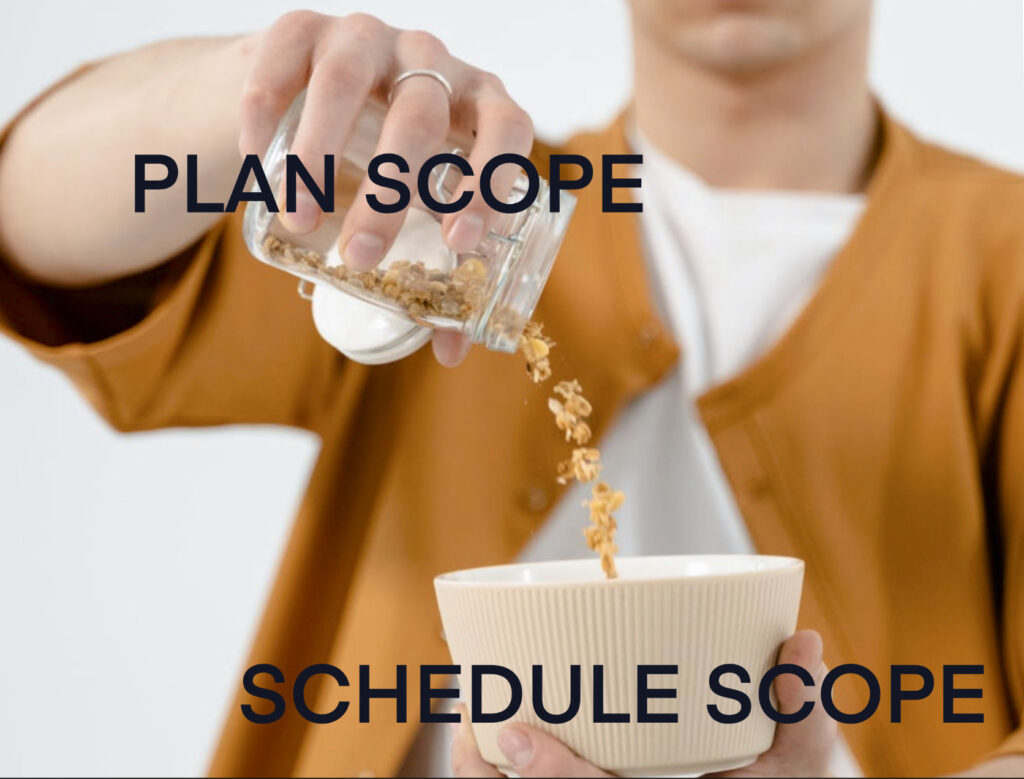
When a work package is out of scope, deliverables will have problems, if not issues. If the plan scope is much greater than the schedule, completing the latter does not complete the project.
We develop the schedule from the plan. The scheduler converts the information to sensible dates and sequences. Once the proposed control execution schedule is approved, an execution baseline is born.
Schedule Variance
A schedule baseline ushers the time to track daily events, progress, and risks. Monitoring and tracking are accomplished by observing variances. Project controls compare the actuals against baseline values.
One must remember that a schedule is a time estimate. Therefore, a schedule variance is anything with a time variance component.
Two principal methods of generating schedule variance
- Control schedule versus Baseline Schedule
- Control schedule versus schedule from previous update
Managing schedule baselines calls for understanding and vigilance. Contractors and clients who agree to a schedule baseline must respect the approved benchmark to avoid conflict, dispute, and litigation.
It is always a good idea to know the difference between terminologies. Let us try it here.
The current schedule is the most up-to-date project control schedule. It is the latest version of the project schedule, the most recent.
A project schedule is a time management document separate from the baseline schedule. The two are not the same!
The baseline is a frozen version (snapshot) of the project schedule. The scheduler regularly updates the project schedule, while a schedule baseline is not. A baseline is an approved benchmark frozen in time.
A relatively lengthy “management of change approval” and notice is required to change the schedule baseline. Changing the baseline follows a strict, more or less rigid rule.
The schedule baseline is a product of the project execution plan, while the current control schedule (project schedule) is an offshoot of the baseline schedule.
Each project checkpoint gate produces a schedule baseline, the most notable of which is the DBM baseline schedule for Gate 2 and the EDS Baseline schedule for Gate 3. The gates and the gated process vary to some degree and shall depend on the governing framework adopted by the company.
The EDS Baseline is the starting point of the Execution Control Schedule. It means the control schedule is the same as the EDS baseline at the beginning of project execution. Updating the control schedule follows. Performance and progress evaluation comes from comparing the control schedule and the baseline.
PMBOK Definition
The PMBOK definition of the schedule baseline states, “It is the approved version of a schedule model that serves as a target. It can only be changed through a formal change control process. It is a useful basis for comparison to actual results. A baseline is accepted and approved by appropriate stakeholders. The main considerations in a schedule baseline are the baseline start and finish dates. During monitoring and control, the project compares the current dates to the approved baseline dates to determine the respective variances (PMI, 2013).”
The project team formulates action plans to mitigate threats or enhance opportunities arising from all discovered variances. These plans give the project manager a solid handle to manage project changes. It helps the project to stay on track, avoiding possible major derailment in the future. For this reason, the schedule baseline is a crucial element of risk-based management.
The baseline should completely represent the project scope and execution plan. Upon approval of the schedule baseline after each Gate and until the Execution Gate, the control schedule is equal to the baseline Figure 2. The most prominent is the Execution Baseline, the basis of the final project sanction.
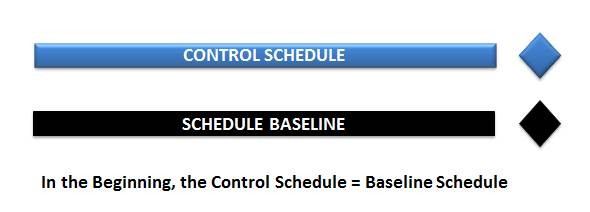
Fun begins
Now, the fun begins. It gets even more exciting when two opposing poles get near each other debating project change notices and non-compliance reports. Arguments usually boil down to the definition of a schedule baseline and the right way to manage it. If there is a governing prior agreement, it becomes easier to reconcile, as the expected answer has to satisfy both clients and contractors.
The perennial argument around schedule baseline management is as old as when the term was first coined. It is sad to detect that many, especially project managers, just missed the points of control.
Variance tracking and monitoring typically start right after the first update. The “control execution schedule” is also described as the “current execution schedule.” The project compares the “current execution schedule” against the “project baseline” to assess progress and performance (Figure 3).
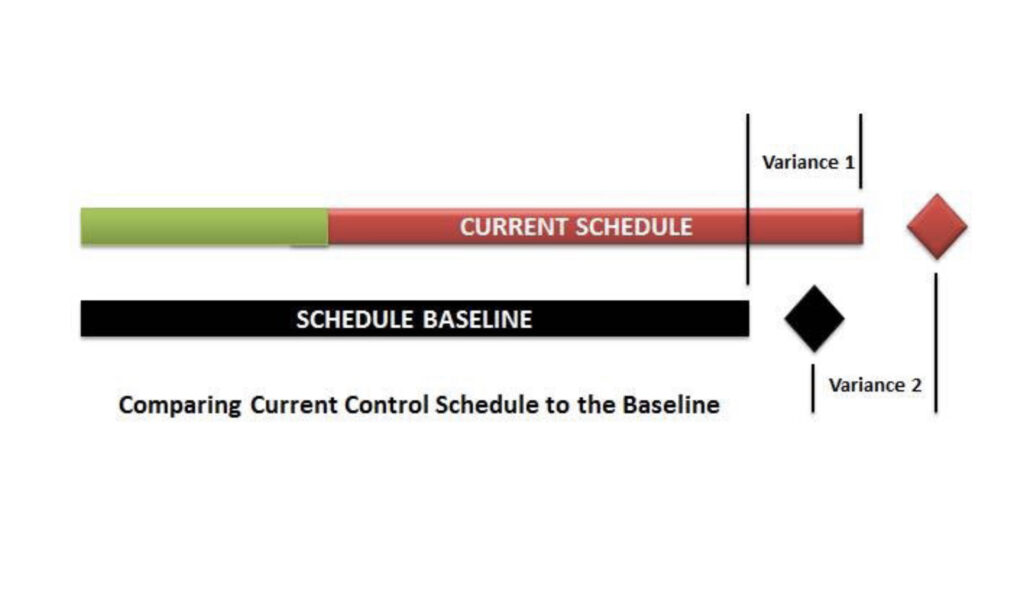
To address this weakness in schedule baseline management, I will share a section of my third book (Frago, R. 2015.Plan to Schedule, Schedule to Plan. Section 10: Schedule Baseline Dilemma\page 56-59.ISBN-978-0-9947608-2-1), to tackle the subject in the next newsletter post.
Bye for now and until next time.
#schedulebaseline #projectbaseline #projectcontrols #planningandscheduling
#riskmanagement #pmspnewsletter #pmspblog #pmsolutionpro #rufranfrago
About the Author:
Rufran C. Frago is the Founder of PM Solution Pro, a Calgary consulting, product, and training services firm focusing on project and business management solutions. He is passionate providing advice, mentorship, education and training through consultation, collaboration, and what he uniquely calls, student-led training.
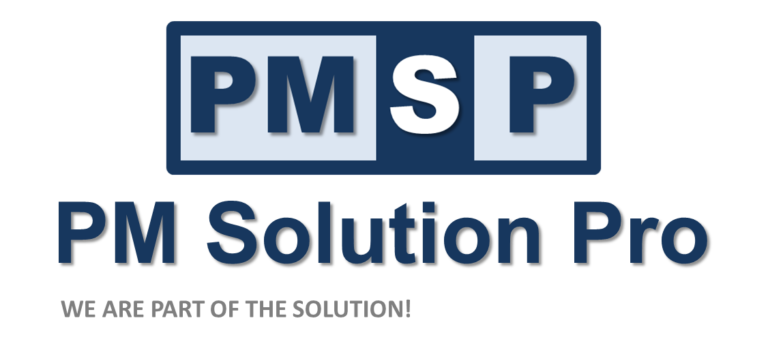
BOOKS AUTHORED BY RUFRAN FRAGO
- Risk-based Management in the World of Threats and Opportunities: A Project Controls Perspective.ISBN 978-0-9947608-0-7.Canada
- Plan to Schedule, Schedule to Plan.ISBN 978-0-9947608-2-1.Canada
- How to Create a Good Quality P50 Risk-based Baseline Schedule.ISBN 978-0-9947608-1-4.Canada
- Schedule Quantitative Risk Analysis (Traditional Method).ISBN 978-0-9947608-3-8.Canada
- RISK, What are you? The Risk Management Poem: Children’s Book for all Professionals.ISBN 978-0-9947608-4-5 (Canada)
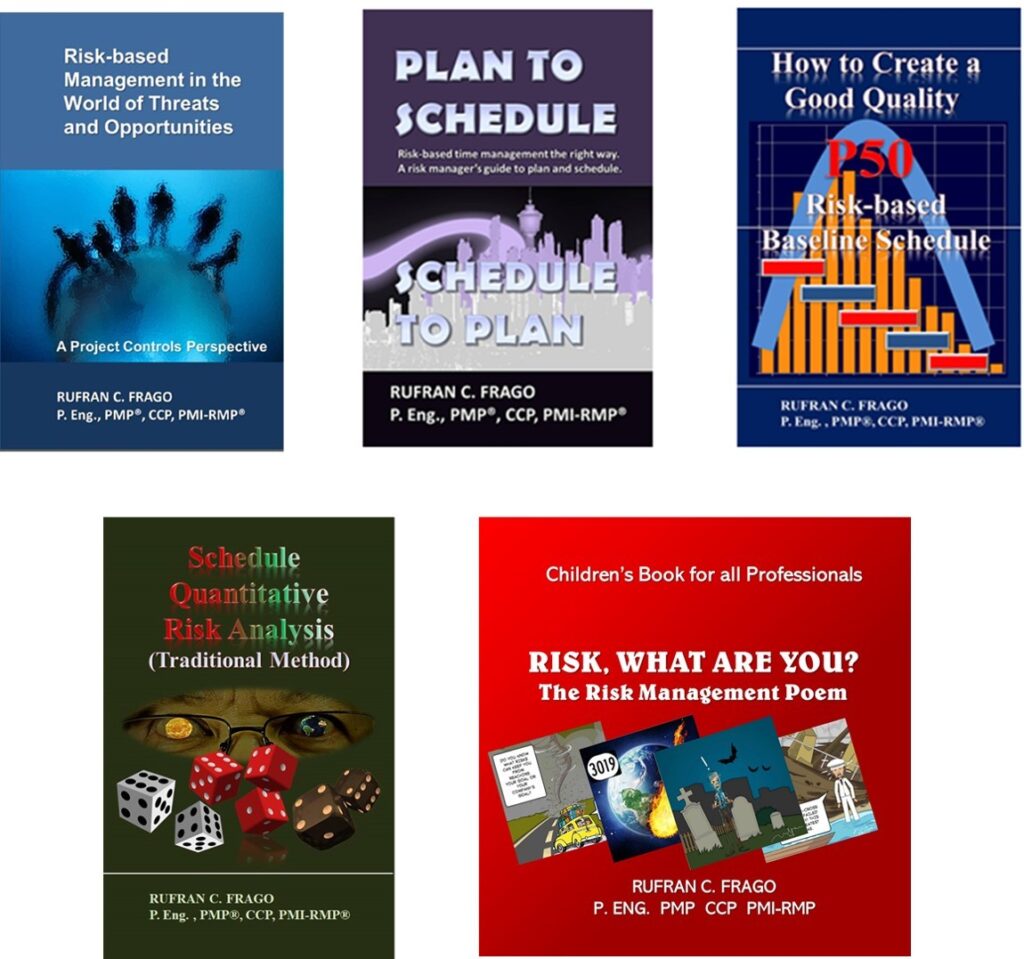
PMSP Business Offering 1
PMSP Business Offering 2
Introduction to PM Solution Pro
OTHER BOOK AUTHORED BY RUFRAN
Grace, The Guardian Angel.ISBN 978-0-9947608-5-2.Canada

